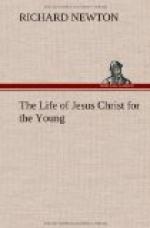And now, having seen what this lesson of liberality is, which Jesus taught, let us look at some of the Scripture proofs of it. The same lesson is taught in other places in the Bible. Let us see what is said about it in some of these places.
In Ps. xli: 1 David says—“Blessed is he that considereth the poor: the Lord will deliver him in time of trouble.” Considering the poor here, means being kind to them, and giving them such things as they need. And the blessing promised to those who do this means that God will reward them by giving to them good things in great abundance. And, if this is so, then we have proof here that “giving is God’s rule for getting.”
We have another proof that “giving is God’s rule for getting,” in Prov. iii: 9, 10. Here Solomon says—“Honor the Lord with thy substance, and with the first-fruits of all thine increase: So shall thy barns be filled with plenty, and thy presses shall burst out with new wine.”
When the Jewish farmers gathered in their harvests they were required to make an offering to God, of what had been gathered, before they used any part of it for themselves; and the offerings thus made were called “the first-fruits.” God considered himself honored by his people when they did this, because they were keeping his commandments and doing what he wished them to do. And the meaning of this command, when we apply it to ourselves, is that we should give something to the cause of God from all the money, or property we have, and from all the gain, or increase that we make to the same. This is the Bible rule—the will or command of God for all his people. And then, in the other part of this passage we have the promise of God to all who do this. “So shall thy barns be filled with plenty, and thy presses shall burst out with new wine.”
This means that they shall be rich and prosperous. And so we see that this passage from the book of Proverbs, teaches the same lesson of liberality that our Saviour taught when he said—“Give and it shall be given unto you.” It proves that “giving is God’s rule for getting.”
And Solomon teaches the same, again, when he says, “The liberal soul shall be made fat; and he that watereth shall be watered also himself.” Prov. xi: 25.
A “liberal soul” means a person who is in the habit of giving; and to be “made fat” means to be prospered and happy. If you undertake to water a garden, you are giving to the thirsty plants that which they need to make them grow and thrive; and when it is promised that the person who does this shall “be watered also himself,” the meaning is that he shall have given to him all that is most important to supply his wants, and make him happy. And this, we see, is only teaching what our Saviour taught when he said, “Give, and it shall be given unto you.” It furnishes us with another proof that “giving is God’s rule for getting.”




